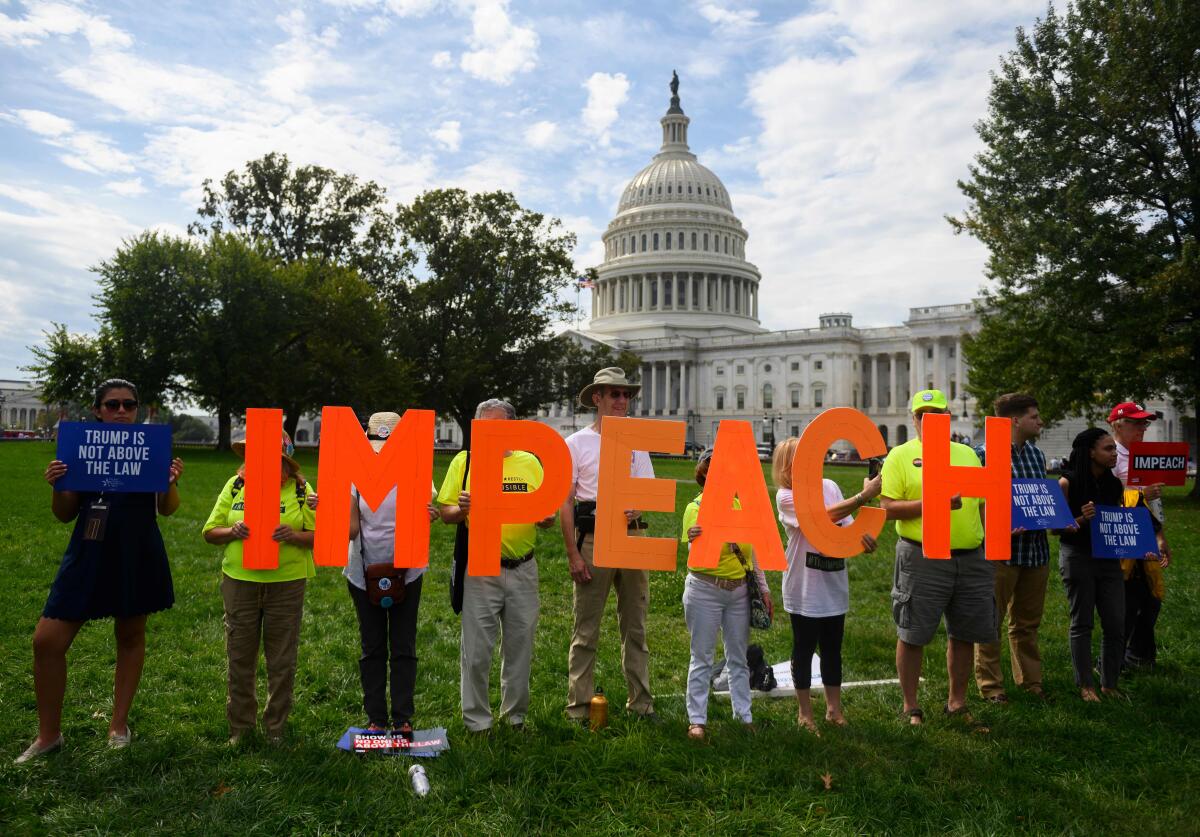Trump’s Big Lie is getting him impeached. It adds to a long line of treacherous GOP fibs

- Share via
We’re likely to be hearing a lot this week about Donald Trump’s Big Lie — that the presidency was stolen from him. This blatant fabrication animated his supporters and in mere weeks turned into an insurrection that now has him facing his second impeachment trial.
There have always been people who believe weird things or theories they wanted to be true. If their numbers were only a few thousand, American democracy would not be seriously threatened.
But the Big Lie about the 2020 election was broadly endorsed by Republican leaders and bought by a vast swath of the party faithful and others. How did we get to a point where a majority of Republicans were willing to defend something so demonstrably false or wrong?
Actually, we’ve been there for a while.
Consider a centerpiece of Republican policy for the last 40 years: tax cuts for the rich as a way to stimulate the economy and make us all better off.
The idea took hold in the Reagan administration as the foundation of Reaganomics. The theory was promoted by the economist Arthur Laffer, and was put to the test in 1981 with President Reagan’s Economic Recovery Tax Act. Laffer and his acolytes insisted that cutting taxes at the high end would spur productive investment, generating so much additional income that there would be no loss of government revenues despite the lower tax rates. That didn’t happen. Instead, as the Congressional Budget Office has calculated, tax revenues plunged, the national deficit exploded, and the rich got a whole lot richer.
Republicans might have learned from that failure and worked harder to think through the relationship between taxation, investment and equity. Instead, since the 1990s, the beneficence of tax cuts has been Republican dogma.
Of course, economics is never solely a matter of fact; it also involves values and behavior. But the facts of physics and chemistry are something else; they are impervious to our feelings about them. Yet Republicans have also struggled with those facts. One egregious example involves acid rain.
By the early 1980s, scientists had concluded (after intense study) that the acid rain poisoning lakes and streams in the Northeast was caused by pollution, primarily from coal-fired power plants. This suggested a need for pollution controls that conservatives generally rejected. As historical archives show, this led the Reagan White House’s science advisor to instruct the head of a major scientific panel on acid rain to alter the committee’s report — after the other panel members had signed off — to make the evidence appear less definitive than it was. The resulting report was then used in Congress to delay action on the grounds that the science was “uncertain.” Meanwhile, other Republicans insisted that if we addressed the problem, the price of electricity would skyrocket.
George H.W. Bush may have been the last honest Republican president; he signed into law an emissions trading program to address acid rain, and it worked, and the price of electricity actually fell. But a few years later, his son George W. Bush, along with most of the rest of Republican leadership, refused to consider the same mechanism — or in fact, any mechanism — to address disruptive climate change.
For decades, Republican leaders have promoted falsehoods, half-truths and misrepresentations about climate change, especially that there was no scientific consensus that climate change was happening or caused by people (false: There has been consensus on both points since the 1990s).
Some Republicans defended skepticism about climate change on the grounds that the costs of fixing it would be so great that people were justified in demanding a very high standard of proof. Perhaps. But by the 2000s, we had that high level of proof, and most independent studies had concluded that the problem would be more expensive not to fix.
Even so, few Republicans leaders changed their public positions. A few years back, Sen. Ted Cruz of Texas promoted the canard that global warming had stopped on its own. For his part, President Trump insisted that the whole thing was a hoax.
That was just one of more than 20,000 false or misleading Trump claims chronicled by the Washington Post. CNN has offered the “the 15 most notable,” from the ridiculous (it didn’t rain on his inauguration) to the dangerous (announcing in January 2020, and later, that the COVID-19 pandemic was “totally under control”). Like Cruz on climate change, he told us the coronavirus would disappear on its own. Donald Trump is not an aberration; he is the apotheosis of Republican mendacity.
For 40 years, Republican leaders have displayed a disdain for information and disregard for facts that don’t fit their policy agenda. Their dishonesty has now culminated in clear and present danger. Nearly half a million Americans are dead from COVID-19 — more than died in World War II combat — and our democracy is facing the greatest threat since the Civil War.
Spin is one thing. Lying about factual matters is another. Republicans have been living with lies for so long that many of them no longer seem to care about — or maybe even recognize — the distinction.
Naomi Oreskes and Erik M. Conway, authors of “Merchants of Doubt: How a Handful of Scientists Obscured the Truth on Issues from Tobacco Smoke to Global Warming,” are working on their next book, “The Magic of the Marketplace: The True History of a False Idea.”
More to Read
A cure for the common opinion
Get thought-provoking perspectives with our weekly newsletter.
You may occasionally receive promotional content from the Los Angeles Times.






